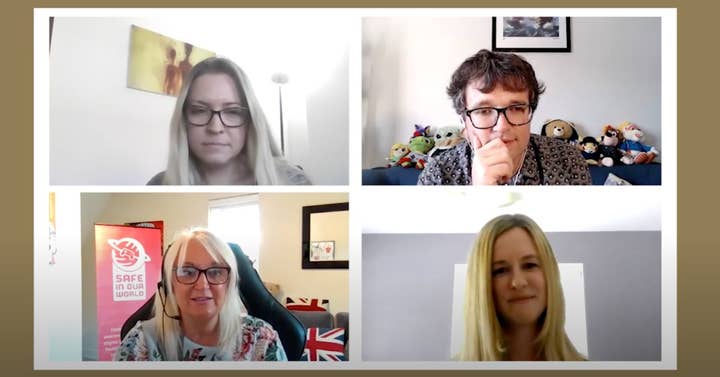How to support your staff's mental health
As part of Gamesindustry.biz's Best Places to Work Awards, we've talked to three panellists about the best practices to champion mental health support at your company
With the ongoing effects of the COVID-19 pandemic, awareness of how mental health affects us in every facet of life has risen markedly.
While the pandemic has helped start conversations and further reduced the stigma associated with these topics, to support mental health, studios should be aware that the journey requires ongoing commitment, especially since workers in the games industry are at a higher risk of developing mental health conditions than in other industries.
The state of mental health knowledge in the games industry
The UKIE Games Industry Census conducted in 2020 revealed that 31% of respondents suffered from anxiety, depression, or both, compared to the UK national average of 17%. This figure, along with the tendency for overwork in the games industry, suggests there's still work to be done, according to Sarah Sorrell, charity officer at Safe in Our World, a mental health awareness charity specialising in the global games industry.
"The COVID-19 pandemic has changed how mental health is talked about"
Sarah Howell
However, with the heightened awareness of the topic brought on by the COVID-19 pandemic, she sees a positive trend to companies becoming more proactive about devising practical help mechanism for their staff.
"The COVID-19 pandemic has changed how mental health is talked about," said fellow panellist Sarah Howell, head of human resources at Creative Assembly. "With the increased number of people suffering from bad mental health, there is also more talk about it."
Ways mental health needs have changed
Companies had to adapt their general work practices to not only facilitate work from home, but also to mitigate the impact of news surrounding the pandemic and lockdown, and respond to practical issues such as employees juggling work and childcare.
Sorrell noted that increased work from home also increased the potential for overwork in the industry when the boundaries between the home and the workplace are missing. These are issues that have been discussed within the games industry and beyond, but it is important to continuously address these subjects even now that lockdowns have ended in many countries.
"We've asked staff how they feel about returning to the office," said Heidi Slee, human resources manager at Third Kind games. "There's no pressure to return, but the option is there, some people who are working with us have never met each other face to face, so it may be very important to them to have that bit of contact."
Slee stressed that to make the decision of whether or not staff should return to the office, flexibility and good listening skills are key. She also stressed that it's as much about what people are saying as to what they aren't saying, or how they are saying it, and that staff, if they do find they're still uncomfortable with returning, should be able to change their minds.
All three highlighted that mental health support measures need continuous attention to actually make an impact and may need adapting after the pandemic is over.
"We want the help that we offer to be relevant even after the pandemic, and in order to be able to do that, we need to check back with staff, and obviously staff expectations of how we can help are very different now," Howell said.
According to Sorrell, demand for permanent remote positions has increased due to the pandemic: "Many people have found their safe space working from home, and this is going to be a massive thing going forward for companies to allow that flexibility to make people safe -- I think it's going to take a while for people to regain their confidence," she said.
The benefits of Employee Assistance Programs
Employee Assistance Programs (EAP) connect a studio's employees with external professionals on different work-related subjects -- finance, legal, mental health and more.
Despite the benefits of such programs, the general awareness and use of EAP among employees is still slightly low, which is why the panellists broke down its advantages (both Creative Assembly and Third Kind Games currently use Employee Assistance Programs in addition to internal support).
Third Kind Games worked directly with Safe In Our World to find a suitable EAP provider: "I found it quite useful to have a representative from the EAP come and give a presentation, as they can answer all the questions somebody might have in a different way than I can," Slee said.

"I think it's important to make sure the program is delivered to people in such a way that they understand everything that is of benefit to them and that their conversations will be confidential."
Howell also stressed the confidentiality aspect of Employee Assistance Programs in order to lower an employee's reticence over making use of it: "That confidentiality part is key -- to have an external, neutral side who aren't going to pass any judgement," she said.
Another important aspect to getting employees to use EAPs is ease of access. Some employees may be scared to bring up legal or mental trouble to their team lead, and so making sure they have direct access to the Employee Assistance provider, for example through a link on the internal company website, can be a great help.
As with all topics mental health and beyond, it's also important that studio leads and managers as well as diversity and inclusion networks employee resource groups, where available, are aware of the options and openly promote them. Howell said that whenever changes happen at Creative Assembly, options such as the EAP are communicated to staff.
"The danger is that if you let it sit it just won't get accessed," she said.
Safe In Our World supports studios of any size in finding an Employee Assistance Provider that fits their needs, and Sorrell is happy to champion them -- for studios of 20 staff and over, Employee Assistance Programs costs about £100 a month, and for smaller companies, Safe In Our World offers an umbrella policy.
How to curb voluntary overwork
One particularly insidious aspect of constant overwork is that many developers subject themselves to it voluntarily, may it be because of the often cited "passion" for their work and its impact, or simply out of habit. Crunch, even when limited to certain periods of the game development cycle, is a reality for many game developers.
But continuous overwork can lead to burnout and a number of other mental health issues -- according to a study by Deloitte, poor mental health costs employers £45 billion a year.
The UKIE census revealed that 3.5% of respondents worked 51 hours a week or more, while three quarters of all respondents reported working a standard work week of 33 to 40 hours.

Howell and Slee suggested that just as with all mental health topics, leads should openly communicate that it is not only okay, but necessary and encouraged for people to actually use their time off.
"Role-modelling is very important," Howell said. "Managers should lead by example. Don't send emails out of hours, recognise the signs of burnout in employees, and actively promote a culture that embraces the benefits of breaks."
Slee echoed this and adds that work should be scoped in a way that makes overtime work unnecessary.
In some cases, the pandemic has further contributed to an unhealthy approach to time off. For many, home office work may be disrupted by other commitments such as child care, leading employees to feel the need to make up for the time lost after hours. Additionally, working in the same space you live in, especially without a dedicated office space, can make it more difficult to switch off.
"People become very good at covering [the mental strain] up," Sorrell said, "But people need to look after themselves. Eat healthily, drink enough water, get enough sleep, and set some boundaries to really take that time away from work."
Working from home isn't the only pandemic-related aspect that leads to voluntary overwork -- with lockdowns and travel restrictions, many employees have been reluctant to take their annual leave, seeing as they wouldn't be able to travel anywhere. However, the panellists agree there are advantages to any and all breaks employees can afford themselves.
"Again, this is an issue of flexibility," Howell said, "Talk to your staff and ask them why they won't take their annual leave, encourage healthy conversations and lead by example."
Advice for companies wanting to set up mental health support frameworks
With the pandemic, awareness of mental health is higher than ever. Due to the many different facets of the topic however, it may be daunting for companies to set up a mental health framework from scratch. Where can they start?
"You need to look around and smell the roses," Slee said. "Think about the support systems you've already got in place and look outside of what people would traditionally associate with mental health -- do you encourage people to take time off, have you got annual leave in place? What do you think you need?
"We've had presentations with Safe in Our World about different mental health conditions, and just opening those conversations meant that people started talking about things and how they could help each other. People need to be confident that there's someone [at your company] they can go to if they need to talk."
"Think about the support systems you've already got in place and look outside of what people would traditionally associate with mental health"
Heidi Slee
Working out what you need can be a collaborative process that involves other studios. Sorrell likes the idea of a games industry mental health network in which best practises are shared and mental health first-aiders and ambassadors are available to help and keep the conversations surrounding mental health topics alive.
She pointed to the resources Safe in Our World has available for just that purpose, such as the #LevelUpMentalHealth initiative, under which companies commit to taking the first steps to set up a mental health framework within 12 months, and get support from the charity to do so. The website has a sample toolkit for employers available.
Howell noted that there is no shame in asking your staff for ideas, either -- on the contrary. Talking to your staff shows your willingness to support their mental health, fosters open communication and a collaborative atmosphere.
"Don't be afraid to ask your staff about what they need -- there are several ways to get that information, be it through surveys or coffee break sessions, whatever fits your ethos of connection with your staff. It's highly likely someone's already thought of a solution," she said.
Whether it's encouraging staff to use an Employee Assistance Program, take time off or make use of internal mental health resources, it's important to offer continuous reminders that these options exist and their use is encouraged.
"You need to keep [mental health support] alive beyond national awareness days -- it doesn't have to be often, but you need to talk about it regularly," said Howell.
"Set up reminders maybe every six weeks and use different channels such as internal newsletters or bring it up after meetings," said Slee.
Here too, it's important to stay flexible, so that the support you're offering is genuine -- lead open conversations and react flexibly to your staff's needs, instead of prescribing a fixed period of days for bereavement, for example.
Make sure you and all managers are aware of what options are available and how they can be tailored to help staff overcome difficult periods. In essence, your desire to offer mental health support needs to be genuine, and the way conversations about it are led at your company should reflect that.
The panel is also available as a podcast. You can find The GamesIndustry.biz Podcast on the podcasting platform of your choice, or download this episode directly here.


